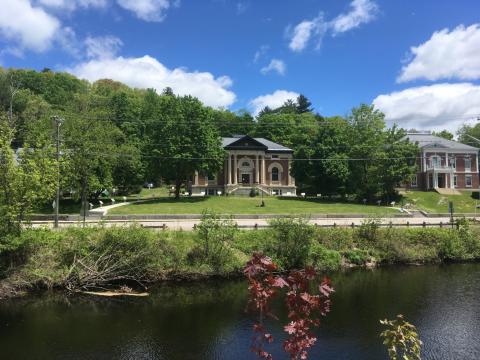Graduate Student Navigates the Flow of Economic Development Thanks to Generous Donors

My interest in community and economic development was first sparked as an undergraduate at Smith College, where I worked on a series of development projects in collaboration with local government and community organizers. This work drew me to a series of professional opportunities in community finance and inspired me to pursue a master’s degree in Environmental Economics through Department of Natural Resources and the Environment, where I conduct research on agriculture and rural development.
As a Granite Stater with a passion for the outdoors, I was delighted by my research objective: to better understand how communities in New Hampshire are leveraging their rivers to build economic vibrancy in the transition from mill town to river town. To meet this objective, I engaged with community leaders and conducted research in six towns and cities across the state, with deeper focus on river development initiatives in Berlin, Nashua, Dover, and Wilton. I also engaged with leaders from Pennsylvania River Towns, a pioneering program of the Pennsylvania Environmental Council that has helped more than 20 PA communities build vibrancy and strengthen their downtown business districts by reconnecting with river resources.
This research revealed key characteristics and behaviors that distinguish river towns from communities that just happen to have rivers running through them. Successful river towns draw community members to downtown riverways with clear sightlines and safe pathways to the water, public boat launches, walkways or parks in the riparian zone, and convenient parking. Common challenges encountered by these communities include environmental impacts related to riverfront development, grant cycle dependence, project scale, and community conflict over project goals and outcomes. Shannon Rogers, Nature Economy State Specialist and Associate Extension Professor, and I compiled our findings in a research brief, which highlights NH communities using their river resources to build economic vibrancy. The brief identifies best practices and characteristics communities should assess when considering the transition from mill town to river town. We also presented findings to the Community and Economic Development Team, who will be able to put our findings to work with communities across the state, many of which have rivers flowing through their downtowns and Main Streets.
I am tremendously grateful for the opportunity to serve as a Darlymple Fellow and would like to express my thanks to Shannon Rogers, Cooperative Extension’s Community and Economic Development Team, and the donors that make this fellowship possible. This fall I will assume my new role as a Community Lender with Maine Harvest Federal Credit Union, a soon-to-launch financial institution dedicated to strengthening Maine’s local food economy as it grows. I look forward to drawing on my fellowship experience as I engage with Maine’s farming community.
